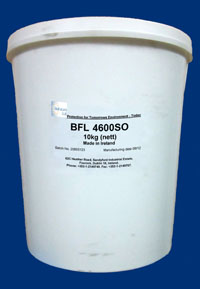// Business Scope » BFL 4600SO
BFL 4600SO
MUNICIPAL|BFL 4600SO
BFL 4600SO-BAD ODOUR REMOVAL & TOXICITY OF NITRIFIERS IN MUNICIPAL WASTEWATER TREATMENT PLANTS.
Outstanding advantages of the product:
* Application of municipal wastewater.
* Oxidation of reduced sulphur compounds in sewers, pumps sumps, lagoons, sludge storage tanks, etc.
* In industrial wastewaters, alkalinity in excess of 50 mg/l expressed as CaCO3 can be required.
* Anoxic tank
* Bad odour removal.
* BFL 4600SO can be used in conjunction with BFL 4000 series products for multi-problems treatment at the same time for a specific application (once-through solutions) in a system depending on the nature of the wastewater being produced. Remember the rule of Golden ratios of BFL products.
* Microbes work under aerobic conditions and as facultative anaerobes.
Sulphides develop in wastewaters from the anaerobic decomposition of organic matter containing sulphur or from the reduction of sulphites and sulphates. The most common sulphide encountered is hydrogen sulphide (H2S). This is a colourless, inflammable gas with the characteristic odour of rotten eggs - a foul smell.
Odour control is a major concern in the operation of many municipal wastewater treatment plants. Foul odours are a public nuisance and give rise to unfavourable publicity. Environmental legislation is becoming stricter all the time especially in relation to odours / air emissions released adjacent to sensitive areas such as housing, recreation parks, schools, etc.
The blackening of wastewater and sludge usually results from the formation of H2S which in turn combines with the iron present to produce ferrous sulphide - which produces a noxious odour when disturbed e.g. when pumping wastewater from storage lagoons or when wasting and thickening sludge.
H2S released to the atmosphere above the wastewater in sewers not flowing to full capacity tends to accumulate at the crown of the pipe. H2S can be oxidised to produce sulphuric acid that will attack both cast-iron and concrete sewage pipes - this corrosion can be severe enough to cause collapse.
H2S is toxic to nitrifying bacteria. These bacteria are highly sensitive and if H2S is present even at low concentrations the nitrifying biomass can be wiped out. The result is lost nitrification, increased levels of ammonia in the final effluent, possibility of fish kills if final effluent is discharged to a sensitive river as well as heavy fines if discharge licence is exceeded.
Build-up and accumulation of H2S in enclosed areas such as pump sumps can be detrimental to the health of the Operator. In many pump sumps the operator has to descend a ladder to check or repair a float, etc. If gas has accumulated in this area then the health and safety of the operator is comprised.
BFL 4600S0 is a biological product that has capabilities of oxidising H2S and other reduced sulphur compounds to produce non-harmful, non-corrosive, odourless end products.
Typical situations in which the use of BFL 4600SO is beneficial include: -
* Treatment of odours associated with primary and secondary sludges
* Removal of H2S associated with storage of wastewater for long periods of time
* Removal of toxicity in wastewaters requiring nitrification
* Seeding or reseeding of biological gas scrubbers /biofilters
* Prevention of build-up and accumulation of H2S gas in enclosed spaces.
BFL 4600SO uses only harmless, natural micro-organisms that eliminate the problem by oxidising soluble sulphides in a highly effective and environmentally acceptable manner.
What is BFL 4600SO?
BFL 4600S0 is a biological product specially formulated to provide chemolithotrophic microbial strains that effectively oxidise H2S and other reduced sulphur compounds to ultimately produce sulphate. Oxygen or nitrate are used as terminal electron acceptors. The equations below illustrate the route of oxidation in the presence of oxygen or nitrate.
Oxygen: H2S + 202 ----> 2H+ + S042-
or
2S + 3O2 + 2H20 ----> 4H+ + 2S042-
Nitrate:
5H2S + 8NO3 ----> 4N2 + 5S042- + 4H20 + 2H+
The microbial species in BFL4600SO grow slowly so it is important to add sufficient numbers so that an effective population is generated as fast as possible. Regular maintenance dosing will sustain biomass and performance. In industrial wastewaters, alkalinity in excess of 50 mg/l expressed as CaCO3 can be required.
The types of systems in which BFL 4600SO can be used include: -
* Biological gas scrubber / Biofilter
* Pump sump
* Sewerage pipe network
* Storage lagoon
* Anoxic tank
* Primary sedimentation tank
* Picket fence thickener
* Thickened sludge storage tank
* Sludge press / Belt press
BFL 4600SO can be used in conjunction with BFL 4000 series products for multi-problems treatment at the same time for a specific application (once-through solutions) in a system depending on the nature of the wastewater being produced. Remember the rule of Golden ratios of BFL products.
Directions for use
Optimum operational conditions for BFL 4600SO:
|
Parameter
|
Minimum | Optimum | Maximum |
| pH | 6.0 | 7 | 8.5 |
| T(oC) | 5 | 25 - 30 | 40 |
Product safety
The micro-organisms in BFL 4600SO have all been isolated from natural environments. They have not been genetically modified in any way. These microbial strains have been classified as being harmless to humans, animals and plants. The product is subjected to independent testing to ensure that it is free of Salmonella and other contaminants.
Product Characteristics:
* Dry preparation containing harmless natural bacteria stabilised on a cereal base.
* Temperature for the growth rate: 5 – 45 C degree
* Bacterial type: Natural microbes which have not been genetically modified and which belong to Group 1 as defined by WHO and EU.
* Salmonella/Shigella: Not detected.
* Appearance: Free flowing tan powder.
* Storage temperature: 0—45oC.
* Shelf life: 2 years.
Performance characteristics:
* Oxidation of reduced sulphur compounds in sewers, pumps sumps, lagoons, sludge storage tanks, etc.
* pH range: 5.0—9.0.
* Manufactured: Ireland, EU
* Available packaging: 5, 10 and 20kg buckets






